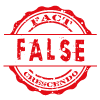

Starbucks, a globally recognized coffeehouse chain is known for its variety of coffees, other beverages and snacks. In recent weeks, several viral claims about Starbucks have gone viral on social media.
Now, people are claiming that Starbucks pies are made with harmful ingredients that do not allow molds to form on it and are also harmful upon consumption. Some of the ingredients mentioned in the post are: Carmine, Soybean oil, Corn syrup, Polysorbate 60.
However, Fact Crescendo found the claim to be false. The ingredients used by Starbucks which are mentioned in the post are approved to be used in foods.
Fact Check-
Let’s check the facts about the above-mentioned ingredients.
Carmine: Cochineal extract and Carmine (E120) has been approved by the US Food and Drugs Administration for use as color additive in foods. But the FDA has instructed brands to label foods and their products with the common name ‘Carmine’.
According to FDA Code of Federal Regulations, Carmine and cochineal extract must be pasteurized or treated to eliminate Salmonella. During this process, only substances that are safe and necessary for the treatment can be added. In case other substances are being added and should not be considered food additives or, if they are, must comply with established safety regulations under the law. It further says that this color additives don’t need certification because they are safe for public health. Hence, the usual certification rules don’t apply to them under the law.
The National Institute of Health report says that since 2000, the acceptable daily intake for cochineal, carminic acid and carmine (E 120) has been limited to 5 mg/kg body weight. This compound gets absorbed into human tissues, but acute, short-term, sub chronic, carcinogenicity, reproduction and developmental toxicity studies conducted in rats or mice did not show any toxicological potential. But there remain some possibilities of allergic reactions.
Corn Syrup: The FDA stated that there is no evidence that High Fructose Corn Syrup (HFCS) is less safe than other sweeteners like sucrose (table sugar) or honey, which have similar amounts of glucose and fructose. However, the 2010 Dietary Guidelines recommend limiting all added sugars, including HFCS, to maintain a healthy diet, a guideline which the FDA fully supports. HFCS has been listed as generally recognized as safe (GRAS) substance when prepared and used under good manufacturing practice under FDA rules.
Soybean Oil: According to a report, the FDA has approved a health claim stating that soybean oil may help reduce the risk of heart disease when it replaces saturated fat in the diet without increasing total calories. This approval is based on scientific studies showing that soybean oil, which is rich in polyunsaturated fats including omega-6 and omega-3, can lower LDL cholesterol levels.
According to another study, soybean oil is high in polyunsaturated fats especially linoleic acid like Omega-6 and Omega-3. Replacing saturated fats in the diet with oils like soybean oil helps to lower LDL cholesterol, which is one of the key risk factors for coronary heart disease. It was found in the research that using soybean oil within prescribed limits does not increase inflammation.
Polysorbate 60: According to the Code of Federal Regulation’s report, Polysorbate 60 is made by combining stearic and palmitic acids with sorbitol and polyoxyethylene. It helps mix ingredients like oil and water and is used in various food products. It is approved for safe use in certain foods. The regulatory body has set limits on the use of Polysorbate 60 in different foods. For example, in cakes and cake mixes, it cannot be more than 0.46% of the dry weight. In icings and fillings, the total amount should not exceed 1% when mixed with similar emulsifiers. These rules ensure Polysorbate 60 is used safely in food.
FDA has also approved the use of Polysorbate 60 as food additive and categorised it as Generally Recognized as Safe (GRAS).
Conclusion:
Fact Crescendo found the claim to be false. All the ingredients of Starbucks mentioned in the post have been approved to be used in food by FDA, European Union and other regulatory bodies.

Title:Starbucks products are safe to consume. Viral claim is based on rumors.
Fact Check By: Drabanti GhoshResult: False


